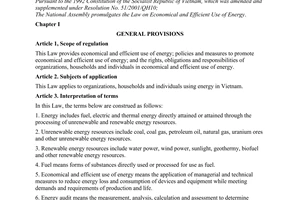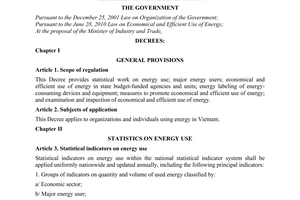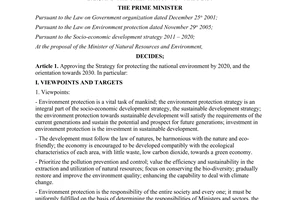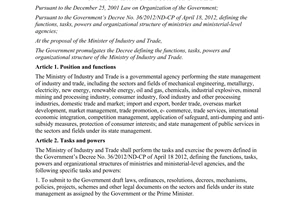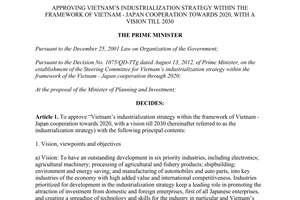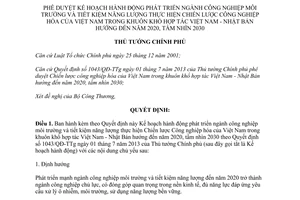Nội dung toàn văn Decision No. 1292/QD-TTg 2014 plan of action to develop the environmental industry and energy
|
THE PRIME
MINISTER |
THE SOCIALIST
REPUBLIC OF VIETNAM |
|
No. 1292/QD-TTg |
Hanoi, August 01, 2014 |
DECISION
APPROVING THE PLAN OF ACTION TO DEVELOP THE ENVIRONMENTAL INDUSTRY AND ENERGY CONSERVATION IN IMPLEMENTATION OF VIETNAM’S INDUSTRIALIZATION STRATEGY WITHIN THE FRAMEWORK OF VIETNAM-JAPAN COOPERATION THROUGH 2020, WITH A VISION TOWARD 2030
THE PRIME MINISTER
Pursuant to the December 25, 2001 Law on Organization of the Government;
Pursuant to the Prime Minister’s Decision No. 1043/QD-TTg of July 1, 2013, approving Vietnam’s industrialization strategy within the framework of Vietnam-Japan cooperation through 2020, with a vision toward 2030;
At the proposal of the Ministry of Industry and Trade,
DECIDES:
Article 1. To promulgate together with this Decision the Plan of Action to develop the environmental industry and energy conservation in implementation of Vietnam’s industrialization strategy within the framework of Vietnam-Japan cooperation through 2020, with a vision toward 2030, under the Prime Minister’s Decision No. 1043/QD-TTg of July 1, 2013 (below referred to as the Plan of Action), with the following major contents:
1. Orientation
To strongly develop the environmental industry and energy conservation into a mainstay industry by 2020, making important contributions to the economy and being capable of meeting the requirements of environmental pollution treatment and sustainable energy use.
2. Objectives
- To complete mechanisms and policies on incentives and support for and create an environment conducive to investment in the development of the environmental industry and energy conservation.
- To intensify examination and supervision and raise awareness about, capacity of enforcement of, and compliance with, the law on environmental protection and energy conservation.
- To attract investment in development and transfer of environmental industry and energy conservation technologies for enterprises to produce products meeting national environmental protection and energy conservation requirements.
- To build capacity for research, receipt, master and transfer of technologies to manufacture environmental treatment and energy conservation equipment suitable to Vietnam’s practical conditions.
3. Plan of Action
The Plan of Action to develop the environmental industry and energy conservation consists of 36 actions classified into five fields (see attached Appendix) as follows:
a/ Field of manufacturing environmental treatment equipment: actions from 1 to 6.
b/ Field of environmental services: actions from 7 to 11.
c/ Field of recycling and reuse of waste: actions from 12 to 16.
d/ Field of energy conservation and greenhouse gas emission reduction: actions from 17 to 25.
dd/ Field of mechanisms, policies and support activities: actions from 26 to 36.
4. Implementation solutions
- The State shall enhance management and create pressure and output markets; and concurrently promulgate and implement mechanisms and policies on incentives and support for the development of the environmental industry and energy conservation.
- To encourage all economic sectors to participate in investment; to attract investment and advanced technologies from abroad in the implementation of this Plan of Action.
- To step up research and application, investment promotion, development cooperation and technology transfer to implement this Plan of Action.
5. Implementation funds
- Funds for implementation of the Plan of Action shall be mobilized from the state budget, international aid, the society, foreign investment and other lawful sources.
- Funds for implementation of actions in the field of mechanisms, policies and support activities shall be ensured by the State from the state budget and partly from foreign financial assistance (if any).
- Funds for implementation of investment actions to develop products of environmental industry and energy conservation shall be mobilized from the society, foreign investment, international aid and other lawful sources.
6. Organization of implementation
a/ The Ministry of Industry and Trade shall:
- Based on the contents of the Plan of Action, organize and assign units under its management to assume the prime responsibility for implementation;
- Act as the focal point in urging and coordinating with other ministries, sectors and localities in implementing the Plan of Action; annually summarize the implementation and report it to the Steering Committee; periodically review and evaluate the results and effectiveness of the implementation of the Plan of Action for reporting to the Prime Minister.
b/ The Ministry of Planning and Investment shall:
- Assume the prime responsibility for, and coordinate with the Ministry of Finance and related ministries and sectors in, determining and allocating financial sources from the state budget for the effective implementation of the actions in the field of mechanisms, policies and support activities; mobilize and coordinate financial assistance sources from abroad and the society and other funding sources for the implementation of the Plan of Action.
- Coordinate with related ministries, sectors and localities in performing specific tasks assigned in the Plan of Action.
c/ The Ministry of Finance shall:
- Assume the prime responsibility for, and coordinate with the Ministry of Planning and Investment in, submitting to competent authorities for approval funding estimates and ensure funds for the implementation of the actions in the field of mechanisms, policies and support activities in the ministries under current regulations.
- Coordinate with related ministries, sectors and localities in performing specific tasks assigned in the Plan of Action.
d/ Related ministries and sectors shall:
- Assume the prime responsibility for, and coordinate with related ministries and sectors in, formulating and implementing specific contents and tasks assigned in the Plan of Action according to their respective functions and tasks.
- Annually evaluate the results and effectiveness of performance of assigned tasks and send them to the Ministry of Industry and Trade for summarization and reporting to the Steering Committee and the Prime Minister.
dd/ People’s Committees of provinces and centrally run cities and industrial parks management boards shall:
- Organize the formulation and implementation of contents and tasks of the Plan of Action according to their functions and tasks.
- Annually evaluate the results and effectiveness of performance of assigned tasks and schemes and send them to the Ministry of Industry and Trade for summarization and reporting to the Prime Minister.
Article 2. This Decision takes effect on the date of its signing.
Article 3. The Minister of Industry and Trade, heads of ministerial-level agencies, heads of government-attached agencies, chairpersons of provincial-level People’s Committees and related organizations and individuals shall implement this Decision.-
|
|
PRIME MINISTER |
PLAN OF ACTION
TO
DEVELOP THE ENVIRONMENTAL INDUSTRY AND ENERGY CONSERVATION IN IMPLEMENTATION OF
VIETNAM’S INDUSTRIALIZATION STRATEGY WITHIN THE FRAMEWORK OF VIETNAM-JAPAN
COOPERATION THROUGH 2020, WITH A VISION TOWARD 2030
(Promulgated together with the Prime Minister s Decision No. 1292/QD-TTg of
August 1, 2014)
I. PRESENT SITUATION
1. Position and role of the environmental industry and energy conservation in Vietnam
The environmental industry has been attracting the society’s attention and development investment. In Vietnam, with a population of 90 million, production, business and daily residential activities are generating large volumes of solid waste, wastewater and exhaust gas that need to be treated by the environmental industry to meet environmental protection requirements.
The 2005 Law on Environmental Protection has assigned the Ministry of Industry and Trade to direct the development of the environmental industry; the Government’s Decree No. 95/2012/ND-CP of November 12, 2012, on the functions, tasks, powers and organizational structure of the Ministry of Industry and Trade also stipulates that the Ministry of Industry and Trade is responsible for the environmental industry.
The Government has promulgated many documents on environmental industry development such as Decision No. 1030/QD-TTg of July 20, 2009, approving the Scheme on development of the environmental industry through 2015, with a vision toward 2025, Decision No. 249/QD-TTg of February 10, 2010, approving the Scheme on development of environmental services through 2020, Decision No. 1216/QD-TTg of September 5, 2012, approving the National Strategy on Environmental Protection through 2020, which sets out the solution: “To develop the environmental industry, attaching importance to developing capacities to provide environmental services, particularly treating and recycling waste,” etc.
Energy conservation has been attracting the society’s attention and development investment attention. The energy conservation and efficiency program has been intensively and extensively implemented. The Law on Energy Efficiency and Conservation was passed by the National Assembly in 2010, the Government’s Decree No. 21/2011/ND-CP detailing the implementation of the Law on Energy Efficiency and Conservation and many other legal documents have been also issued.
According to forecasts, Vietnam will have to import energy for socio-economic development. Therefore, in order to ensure sustainable development, energy conservation and efficiency have become an imperative requirement under the pressure of limited domestic primary energy supply sources and the global trend of energy price rise, as well as the achievement of the objectives of the national strategy on green growth, the national target program on energy conservation and efficiency... This requirement has been institutionalized in the Law on Energy Efficiency and Conservation.
Industry plays an important role because industry is both the big “consumer” of energy (such as ceramics, pottery, paper, steel and cement industries) and the “manufacturer” of energy conservation equipment.
2. Analysis of supply and demand of the environmental industry and energy conservation in Vietnam
Generated waste constantly increases in volume and becomes more and more complicated in nature, thus exerting greater and greater pressure on the environment and requiring the development of new treating/processing capacities to definitely solve current environmental problems. According to the Ministry of Construction’s forecasts, the volume of residential solid wastes generated from cities of grade IV or higher will reach approximately 37,000 tons a day by 2015 and 59,000 tons by 2020, an increase of 1.7 - 4 times over the present figure. The volume of solid waste discharged from industrial parks and industrial clusters in Vietnam is predicted to reach about 26,000 tons a day by 2015 and 57,000 tons a day by 2020, in which hazardous waste will account for about 0.4%. Survey results show that every hectare of industrial park discharges about 25-50 m3 of wastewater a day and about 200 tons of solid waste a year. By December 2013, Vietnam had 293 industrial parks, more than 878 industrial clusters and 15 operating economic zones. Of 207 operating industrial parks, 158 have centralized wastewater treatment systems in operation, accounting for 76.3%. Due to their general inter-sectoral characteristics, economic zones do not have centralized wastewater treatment systems but use those of industrial parks located within these zones. For industrial clusters, according to the Ministry of Natural Resources and Environment’s 2013 statistics, just some 3% of operating industrial clusters have centralized wastewater treatment systems while the rest, 97%, do not have wastewater treatment systems meeting environmental output standards.
According to the Ministry of Natural Resources and Environment’s 2011 national environmental report, the volume of ordinary solid wastes generated nationwide reached some 28 million tons a year, in which ordinary industrial solid waste was 6.88 million tons a year; residential solid waste, about 19 million tons a year; and ordinary medical solid waste, about 2.12 million tons a year. The collection and treatment of ordinary solid wastes were carried out mainly by local urban environmental companies. The estimated rate of collected solid wastes was about 83% in urban areas and 40 - 55% in rural areas; the estimated rate of collected and treated hazardous wastes was about 65%; and that of collected medical solid wastes, over 75%.
The service sector, including transport, health and tourism, also discharges a large part of the total waste volume, with a high rate of hazardous waste. The health sector alone currently has about 13,500 establishments in operation, including 1,263 hospitals at all levels, over 1,000 environmental industry and preventive medicine institutes and centers and other private establishments. The total volume of solid wastes generated from environmental industrial and health establishments is about 350 tons a day, of which hazardous wastes account for 10-20% (an average of 40.5 tons a day at present). This type of waste sees a rather high increase rate of about 7.6% a year. The current very low treatment capacity meeting just about one-third of demand will be not a small challenge to the environmental industry.
According to 2011 statistics, the number of enterprises operating in the environmental field was 928, of which more than 10 enterprises specialized in manufacturing environmental industrial equipment like air and dust filtering systems and hazardous and ordinary waste incinerators and technological equipment used for sorting garbage and manufacturing compost fertilizers and energy pallets; 125 enterprises are engaged in water drainage and wastewater treatment (105 plants treating wastewater for industrial parks with a total design capacity of 201,950 m3 a day, accounting for 61% of the total number of operating industrial parks, and the wastewater treatment capacity increasing about 10% a year; in urban areas nationwide, there are 20 projects with a total capacity of 1.75 million m3 a day, including 12 operating plants with a total capacity of 415,000 m3 a day); and 473 enterprises provide solid waste treatment services. According to the Ministry of Natural Resources and Environment’s statistics, by May 2012, Vietnam had 86 licensed enterprises engaged in hazardous waste treatment. The number of laborers working in the environment-related fields in 2011 was 82,406; including 27,713 in water exploitation, treatment and supply (43%); 31,738 laborers in collection, treatment and destruction of garbage and recycling of scraps (49%), and about 4,687 in other fields.
The demand for environmental industrial technology and equipment by 2020 is expected to be very high in the fields of collection, transport and treatment of solid wastes (urban residential solid waste, industrial and medical solid waste and hazardous waste); treatment of urban and industrial wastewater; manufacture of wastewater, exhaust gas and solid waste equipment; research, development and transfer of environmental pollution treatment equipment suitable to Vietnam’s conditions. In the field of energy conservation, potential for development are research, transfer and support of application of energy-saving technological processes for energy-intensive manufacturing industries like steel, paper, cement, ceramics and porcelain; research and development of green technology products like LED lights, high-efficiency electronic and refrigerating devices, etc.
The Scheme on development of the environmental industry through 2015, with a vision toward 2025, approved by the Prime Minister in Decision No. 1030/QD-TTg of July 20, 2009, has been implemented with certain results. A master plan on development of Vietnam’s environmental industry through 2020, with a vision toward 2030, has been formulated and submitted to the Government; a government decree on development of the environmental industry is being drafted with provisions on policies to support and encourage development of the environmental industry. Many types of waste treatment technology and equipment have been studied, showing potential of transfer and application in reality. Many environmental industry enterprises have been formed and developed, partly meeting the domestic demand for environmental treatment technologies and equipment.
Energy conservation in production and consumption has become a public concern. However, products and equipment that are energy-efficient or use new or renewable energy have not yet been developed. At present, only few types of energy-efficient equipment have been manufactured and used, such as compact fluorescent lights, LED lights, deep- groove ball bearings in electric motors, electric fans, washing machines and inverter air conditioners, electric rice cookers and refrigerators, etc. The potential of energy conservation and efficiency in production and consumption is huge but the energy conservation solutions currently applied in industry are mainly based on the change of management and production organization rather than on investment in energy-efficient production lines, technologies and equipment because Vietnam does not have yet adequate infrastructure and legal documents that support the proliferation of energy conservation and efficiency technologies and equipment in industry.
3. Current problems in the environmental industry and energy conservation in Vietnam
At present, the low-capacity environmental industry can only treat 2-3% of urban wastewater, 15% of solid waste, about 14% of hazardous waste; many recycling activities remain undeveloped such as recycling discarded oil, plastic scraps, electric and electronic wastes.
Funds invested in the development of the environmental industry and energy conservation remain low, failing to meet the requirements of the society. Environmental services, particularly urban wastewater treatment services, still depend largely on state budget funds.
The master plan on development of the environmental industry has not yet been approved, though the deadline stated in the Prime Minister’s Decision No. 1030/QD-TTg has passed.
Mechanisms and policies on environmental protection and energy conservation, which are still incomplete and asynchronous, have not been strictly and effectively implemented. The poor enforcement of the environmental protection law has led to the situation that many enterprises fail to seriously perform their responsibility to invest in environmental treatment. The low charges for environmental services are unattractive to investors. These will be difficulties for the development of the environmental industry and energy conservation.
Infrastructure, technological lines and equipment using energy efficiently in industry as well as projects manufacturing energy-efficient products demand high technologies and large investment, while Vietnamese enterprises have limited financial resources. Many enterprises have no opportunity to access energy-efficient technological lines and equipment in production. Enterprises manufacturing energy-efficient equipment just stop at assembling and processing. The number of industrial products in the field of environment and energy conservation remain limited, merely concentrating on the treatment of solid waste, wastewater and hazardous waste, and have a low technological content. Therefore, the application of energy-efficient technologies and equipment in industry is not popular.
The capacity of and linkage between research and development and mass production of environmental and energy-efficient equipment are still limited. Many state-owned environmental enterprises are still weak in capital investment and technology. In a number of fields, foreign enterprises hold dominating roles; private enterprises have no opportunity to develop.
Incomplete statistics about the environmental industry and energy conservation are exerting negatively impacts on the process of supervision and policymaking for this industry.
II. ORIENTATION TOWARD 2020
To strongly develop the environmental industry and energy conservation into a mainstay industry by 2020, making important contributions to the economy and being capable of meeting the requirements of environmental pollution treatment and sustainable energy use.
III. OBJECTIVES BY 2020
1. To complete mechanisms and policies on incentives and support for and create an environment conducive to investment in the development of the environmental industry and energy conservation.
2. To intensify examination and supervision and raise awareness about, capacity of enforcement of, and compliance with, the law on environmental protection and energy conservation.
3. To attract investment in development and transfer of technologies of developing the environmental industry and energy conservation for enterprises to produce products meeting national environmental protection and energy conservation requirements.
4. To build capacity for research, receipt, master and transfer of technologies of manufacturing environmental treatment and energy conservation equipment suitable to Vietnam’s practical conditions.
IV. STRATEGIC ISSUES
1. The investment environment, including the legal framework, administrative procedures, the Government’s incentive policies and other elements such as information, community awareness, implementation capacity and supervision of enforcement of promulgated regulations, etc., plays a very important role in investment attraction. Therefore, in order to successfully implement the Industrialization Strategy and Plan of Action to develop the environmental industry and energy conservation, it is necessary to improve mechanisms and policies to support development and create an environment conducive to investment. Mechanisms and policies should be synchronous and consistent and formed on the basis of consultation of enterprises, thus both creating a motive force for investment and exerting pressure on manufacturers to create the demand of the consumption market for products of investors.
2. On the basis of the created favorable investment environment, information should be widely publicized to and efforts be concentrated on attracting investment from potential enterprises in order to achieve the objectives of the Plan of Action.
3. To mobilize to the utmost the participation of the Government, enterprises, scientists and experts from institutes and universities and international specialists in the building, development and evaluation of the development of the environmental industry and energy conservation.
4. To increase supervision of the market and the implementation of regulations, and periodically publicize supervision results.
V. PLAN OF ACTION
|
No. |
Action |
Implementation period |
Implementing agency |
Coordinating agencies |
|
A |
Manufacture of environmental treatment equipment |
|||
|
1 |
Manufacture of fabric and electrostatic dust filter bags for factories that emit great exhaust gas volumes in cement industry and thermal power plants, etc. |
2015 - 2020 |
Ministry of Industry and Trade |
Ministry, of Construction, Ministry of Natural Resources and Environment |
|
2 |
Manufacture of modular wastewater treatment tanks to treat scattered wastewater suitable to scattered buildings, condominiums, residential areas, craft villages and isolate service points, etc. |
2015 - 2020 |
Ministry of Construction |
Ministry of Industry and Trade, Ministry of Natural Resources and Environment |
|
3 |
Manufacture of road sweeper trucks with cleaning brushes and water sprayers, garbage trucks, mud-sucking trucks, sewer jetting trucks, etc. |
2015 - 2020 |
Ministry of Transport |
Ministry of Industry and Trade, Ministry of Construction |
|
4 |
Manufacture of hygienic waste treatment systems on means of public transport (carriages, ships) |
2015 - 2020 |
Ministry of Transport |
Ministry of Industry and Trade, Ministry of Construction |
|
5 |
Manufacture of garbage-sorting equipment, garbage incinerators and microbial fertilizer production lines |
2015 - 2020 |
Ministry of Construction |
Ministry of Industry and Trade, Ministry of Natural Resources and Environment |
|
6 |
Manufacture of equipment of environmental analysis and observation |
2015 - 2020 |
Ministry of Natural Resources and Environment |
Ministry of Industry and Trade |
|
B |
Development of environmental services |
|||
|
7 |
Building of centralized urban wastewater treatment plants in cities |
2015 - 2020 |
Municipal People’s Committees |
Ministry of Natural Resources and Environment, Ministry of Construction |
|
8 |
Building of centralized industrial wastewater treatment stations in industrial parks |
2015 - 2020 |
Industrial Parks’ Management Boards |
Ministry of Planning and Investment, Ministry of Natural Resources and Environment, Ministry of Construction |
|
9 |
Building of plants sorting garbage, producing microbial fertilizers and incinerating garbage in combination with heat recovery or power generation |
2015 - 2020 |
Ministry of Construction |
Ministry of Industry and Trade |
|
10 |
Building of centralized hazardous waste treatment plants |
2016 - 2020 |
Ministry of Natural Resources and Environment |
Ministry of Industry and Trade |
|
11 |
Development and transfer of technologies to treat wastewater of leather tanning and sugarcane industries |
2015 - 2020 |
Ministry of Industry and Trade |
Related ministries, sectors and organizations |
|
C |
Waste recycling and use |
|||
|
12 |
Building of plants to recycle plastic scraps into fuel oil or other products |
2015 - 2020 |
Ministry of Industry and Trade |
Ministry of Natural Resources and Environment, Ministry of Construction |
|
13 |
Building of plants to recycle discarded oil into fuel oil or other products |
2015 - 2020 |
Ministry of Industry and Trade |
Ministry of Natural Resources and Environment, Ministry of Construction |
|
14 |
Building of centers to collect and recycle expired means of transport |
2015 - 2020 |
Ministry of Transport |
Ministry of Industry and Trade, Ministry of Natural Resources and Environment |
|
15 |
Experimentation and application of a model of collecting and recycling discarded electric and electronic equipment |
2015 - 2020 |
Ministry of Natural Resources and Environment |
Ministry of Industry and Trade, Ministry of Construction |
|
16 |
Experimentation and application of the model of production of biodiesel and other valuable products (DHA, alkaloids, anti-oxidants) from such materials as fish fat, animal fat, discarded edible oil, rubber, Jatropha and Pongamia pinnata seeds |
2015 - 2020 |
Ministry of Industry and Trade |
Ministry of Agriculture and Rural Development and related ministries, sectors and organizations |
|
D |
Energy conservation, greenhouse gas emission reduction |
|||
|
17 |
Investment in the manufacture of LED lights |
2015 - 2020 |
Ministry of Industry and Trade |
Ministry of Science and Technology, Ministry of Construction |
|
18 |
Development of infrastructure, legal framework and manufacture of equipment to serve the popular use of high-efficiency natural gas in industries in the country |
2018 - 2020 |
Ministry of Industry and Trade |
Ministry of Construction, Ministry of Transport |
|
19 |
Application of the model of energy conservation and greenhouse gas emission reduction in beer factories |
2014 - 2020 |
Ministry of Industry and Trade |
Related ministries, sectors and organizations |
|
20 |
Application of the energy conservation model in hospitals, hotels and big office buildings |
2014 - 2020 |
Ministry of Construction |
Ministry of Industry and Trade and related ministries, sectors and organizations |
|
21 |
Application of the energy efficiency improvement model in fishery processing plants |
2014 - 2020 |
Ministry of Industry and Trade |
Related ministries, sectors and organizations |
|
22 |
Improvement of energy efficiency in enterprises in energy-intensive industries |
2015 - 2020 |
Ministry of Industry and Trade |
Related ministries, sectors and organizations |
|
23 |
Development of wastewater treatment technologies of the food processing industry by the method of ozone agitation using swirling jet |
2015 - 2020 |
Ministry of Natural Resources and Environment |
Related ministries, sectors and organizations |
|
24 |
Development of technologies to treat mud discharged from urban wastewater treatment stations and organic wastes discharged from hotels, restaurants and households with energy salvage |
2015 - 2020 |
Ministry of Natural Resources and Environment |
Related ministries, sectors and organizations |
|
25 |
Investment in the manufacture of durable biogas equipment |
2015 - 2020 |
Ministry of Industry and Trade |
Related ministries, sectors and organizations |
|
E |
Mechanisms, policies and support activities |
|||
|
26 |
Formulation of a government decree on development of the environmental industry |
2014 - 2015 |
Ministry of Industry and Trade |
Ministry of Natural Resources and Environment, Ministry of Planning and Investment, Ministry of Finance |
|
27 |
Review and improvement of mechanisms, policies and legal framework on energy conservation and efficiency |
2014 - 2020 |
Ministry of Industry and Trade |
Ministry of Science and Technology, Ministry of Planning and Investment, Ministry of Finance, Ministry of Construction, Ministry of Transport |
|
28 |
Issuance of minimum energy efficiency standards and sticking of energy labels to products |
2014 - 2020 |
Ministry of Industry and Trade |
Ministry of Science and Technology, Ministry of Transport, Ministry of Construction, Ministry of Transport, Ministry of Agriculture and Rural Development |
|
29 |
Development of mechanisms and policies to subsidize buying prices of electricity from accompanying electricity generation turbines in garbage incinerating plants and those fueled by biogas |
2014 - 2015 |
Ministry of Industry and Trade |
Ministry of Natural Resources and Environment, Ministry of Planning and Investment, Ministry of Finance |
|
30 |
Development of mechanisms and policies to support investment in the manufacture and consumption of LED lights |
2014 - 2015 |
Ministry of Industry and Trade |
Ministry of Natural Resources and Environment, Ministry of Planning and Investment, Ministry of Finance |
|
31 |
Revision of Government Decree No. 04/2009/ND-CP of January 14, 2009, on incentives and supports for environmental protection activities |
2014 - 2015 |
Ministry of Natural Resources and Environment |
Ministry of Planning and Investment, Ministry of Finance |
|
32 |
Review and improvement of legal documents, standards regulations and norms related to environmental protection |
2014 - 2015 |
Ministry of Natural Resources and Environment |
Ministry of Industry and Trade, Ministry of Construction |
|
33 |
Improvement of mechanisms and policies and guidance on the implementation of the Vietnam- Japan Joint Credit Mechanism (JCM) |
2014 |
Ministry of Natural Resources and Environment |
Ministry of Planning and Investment, Ministry of Finance |
|
34 |
Formulation of regulations on appraisal of technologies and quality management of environmental treatment equipment and technological lines |
2014 - 2015 |
Ministry of Science and Technology |
Ministry of Natural Resources and Environment, Ministry of Construction, Ministry of Industry and Trade, Ministry of Transport |
|
35 |
Formulation of regulations on construction of wastewater treatment clusters for apartment buildings, residential clusters and big buildings |
2014 |
Ministry of Construction |
Ministry of Natural Resources and Environment |
|
36 |
Program on scientific research, application and transfer of technologies to develop the environmental industry in the 2016 - 2020 period (continuing to implement the Scheme on development of Vietnam’s environmental industry through 2015, with a vision toward 2025 under the Prime Minister’s Decision No. 1030/QD-TTg of July 20, 2009) |
2016 - 2020 |
Ministry of Industry and Trade |
Ministry of Science and Technology, Ministry of Construction, Ministry of Natural Resources and Environment and related ministries, sectors and units |
VI. ORGANIZATION OF IMPLEMENTATION AND SUPERVISION MECHANISM
1. The Ministry of Industry and Trade shall:
- Based on the contents of the Plan of Action, organize and assign units under its management to assume the prime responsibility for implementation;
- Act as the focal point in urging and coordinating with other ministries, sectors and localities in implementing the Plan of Action; annually summarize the implementation situation and report it to the Steering Committee; periodically review and evaluate the results and effectiveness of the implementation of the Plan of Action for reporting to the Prime Minister.
2. The Ministry of Planning and Investment shall:
- Assume the prime responsibility for, and coordinate with the Ministry of Finance and related ministries and sectors in, determining and allocating financial sources from the state budget for the effective implementation of the actions in the field of mechanisms, policies and support activities; mobilize and coordinate foreign financial sources and the society and other funding sources for the implementation of the Plan of Action.
- Coordinate with related ministries, sectors and localities in performing specific tasks assigned in the Plan of Action.
3. The Ministry of Finance shall:
- Assume the prime responsibility for, and coordinate with the Ministry of Planning and Investment in, submitting to competent authorities for approval funding estimates and ensure funds for the implementation of the actions in the field of mechanisms, policies and support activities in the ministries under current regulations.
- Coordinate with related ministries, sectors and localities in performing specific tasks assigned in the Plan of Action.
4. Related ministries and sectors shall:
- Assume the prime responsibility for, and coordinate with related ministries and sectors in, formulating and implementing specific contents and tasks assigned in the Plan of Action according to their respective functions and tasks.
- Annually evaluate the results and effectiveness of performance of assigned tasks and send them to the Ministry of Industry and Trade for summarization and reporting to the Steering Committee and the Prime Minister.
5. People’s Committees of provinces and centrally cities and industrial parks’ management boards shall:
- Organize the formulation and implementation of contents and tasks of the Plan of Action according to their functions and tasks.
- Annually evaluate the results and effectiveness of performance of assigned tasks and schemes and send them to the Ministry of Industry and Trade for summarization and reporting to the Prime Minister.
6. Supervision of implementation of the Plan of Action
- The Ministry of Industry and Trade shall supervise and evaluate the general implementation of the Plan of Action to develop the environmental industry and energy conservation; and annually report it to the Strategy Implementation Steering Committee and the Prime Minister.
- The Ministries of: Science and Technology; Natural Resources and Environment; Finance; Planning and Environment; and related ministries and sectors shall supervise and implement the implementation of the Plan of Action to develop the environmental industry and energy conservation according to their respective functions and tasks and the assignment in the Plan of Action; and annually send evaluation results to the Ministry of Industry and Trade for summarization and reporting to the Strategy Implementation Steering Committee and the Prime Minister.
- Before December 15 every year, the Ministries assigned to implement the actions in the Plan of Action shall report implementation results to the Ministry of Industry and Trade for summarization and reporting to the Strategy Implementation Steering Committee and the Prime Minister.
7. Adjustment of the Plan of Action
In the course of implementation of the Plan of Action, if finding it necessary, the Ministry of Industry and Trade shall report it to the Strategy Implementation Steering Committee to adjust and supplement the Plan of Action to meet practical requirements.-



